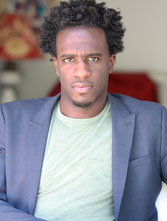NCP Member-Only Blog > Fredrick Edo-Okuonghae Featured in The American Psychoanalyst
 Fourth-year candidate Fredrick Edo-Okuonghae, PsyD, LMFT, was invited by The American Psychoanalyst to write about his experience at the most recent APsaA conference, its first in-person meeting in 2.5 years.
Fourth-year candidate Fredrick Edo-Okuonghae, PsyD, LMFT, was invited by The American Psychoanalyst to write about his experience at the most recent APsaA conference, its first in-person meeting in 2.5 years.
When I was invited to write my reflection on my experience at the 111th annual APsaA meetings, I hesitated, a hesitation not so different from what I have often experienced in public psychoanalytic settings. Before speaking or writing, I invariably ask myself a question: will I be seen as a clinician or as a Black person who happens to be a clinician?
As I entered the Boston Park Plaza, I felt a sense of relief. After two years away because of Covid, I was back. I remembered all the talk about diversity and race at the last in-person meeting in February 2020 in New York. I knew those topics were still up for discussion. I immediately prepared myself to face the same hesitations I had often experienced. I was not sure how I was going to face my ongoing conundrum: seeing myself as a psychoanalytic candidate in my third year in training vs. being seen as something other than that. I know that many individuals only see me as a Black clinician and lose sight of the other many parts of me.
I decided to take a walk outside to see what Boston was all about since it was my first time there. I quickly noticed that the city also was segregated in many ways despite its reputation for being highly educated. After a couple of hours outside, I returned to the Boston Park Plaza and was met by a recent graduate at my institute who introduced me to Sandra Walker, a faculty member of the Seattle Institute. I felt the hesitation again. It was indeed refreshing to engage in a lengthy conversation with her, but still I was wondering: am I being seen as a psychoanalytic candidate in training or a Black person who is in field?
The first meeting I attended on Saturday was Dorothy Holmes's presentation, “Oh, Psychoanalysis: Wherefore art thou? A conversation about tensions, splits, and opportunities in psychoanalytic identity.” In the Q and A, I listened as another candidate stood up and addressed the room full of attendees. She said she wanted the audience to not be scared of her and of her Black colleagues and peers simply because they are Black. I immediately felt seen, perhaps exposed, perhaps recognized.
I asked the person who spoke up what allowed her to make the statement. She spoke to me of her need for visibility and for working together to eliminate white spaces and to diversify the rooms we work in.
I then attended the panel discussion “But It's Not Psychoanalysis: Expanding our definition of what can and can't be seen as psychoanalysis.” I stood up during the Q and A and gave my reflections on the talk. This time I felt like a psychoanalytic candidate attending my second in-person meeting.
I then attended the meeting labeled “Holmes Commission Report: Equity in Psychoanalysis: What Race has to do with it.” And again I spoke up during the Q and A—I am of darker skin and I am here! I declare my visibility and insist that the needle must move, that diversity is in the works. I yearn to experience the day where my hesitations vanish and I, like all of us, can simply say what is on my mind.
Fredrick Edo-Okuonghae, PsyD, LMFT
Candidate, New Center for Psychoanalysis
